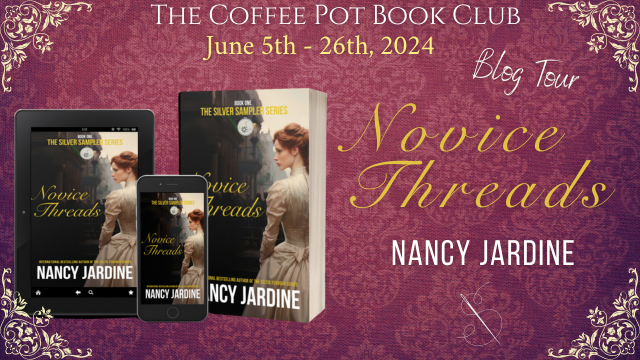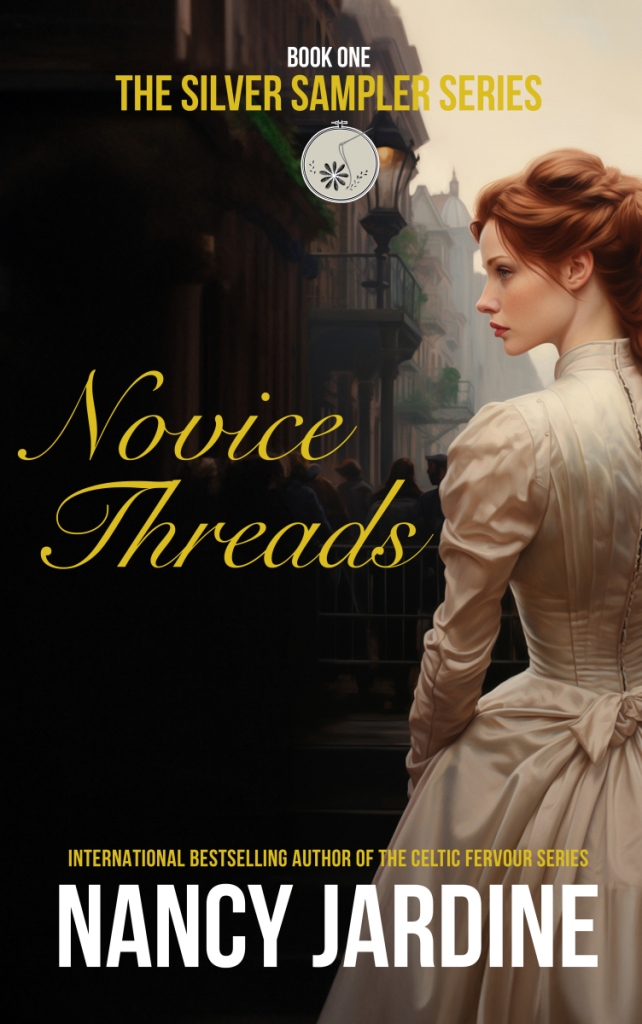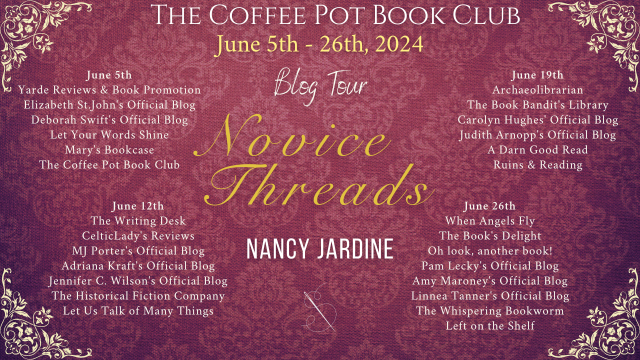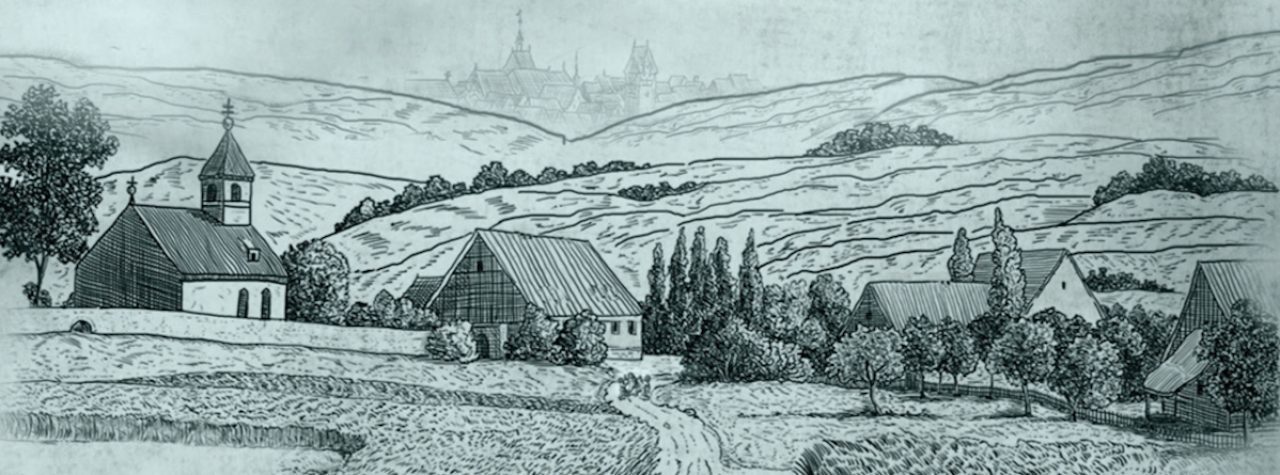On my blog today I am delighted to be hosting NANCY JARDINE, sharing news of the recent publication of her new book, Novice Threads. This is the first novel in Nancy’s new Silver Sampler series, set in Victorian Scotland.

You can find out more about Novice Threads below but, first, read an interesting post from Nancy about one of the book’s fundamental themes: Victorian Morality.
Good Old Victorian Morality!
What exactly does that phrase mean to us in 2024? And was it so different for those living in 1855, like my character – Margaret – in Novice Threads?
Did the Victorian era gain its reputation of high morality because it was in direct contrast to the previous Georgian and Regency periods? The answers, I think, are not that simple but the loose morals and extravagance of the rich people of the Georgian and Regency periods are definitely seen as being in contrast to the more strict morality, and seriousness of purpose, of the Victorian era.
The Victorian era officially began in 1837 – after the death of King William IV and the ascension to the throne of Victoria, daughter of William’s brother – Victoria being the only legitimate live descendant.
There were many children sired by William, who were living in 1837, but none were of legitimate birth and could never become the monarch. Was William’s string of bastard children – at least ten of them born to William’s mistress, the ex-stage actress ‘Mrs. Jordan’ – the reason that the concept of Victorian morality became popular? William had ended his long-term affair with ‘Mrs Jordan’ in 1811, but paid her a financial settlement every year, in-part for the upkeep of his children. This was money William could ill afford since he wasn’t wealthy and huge debts dogged him for decades. Even though William married Adelaide in 1818 (a princess of a small German principality), and seemed to be faithful to her for the rest of his life, his earlier licentiousness gave him a poor reputation.
It’s known that the young Victoria led a very sheltered life, constraints put upon her by her mother the Duchess of Kent and Strathearn, and Sir John Conroy who effectively controlled her mother’s limited finances. Victoria’s father died before she was a year old and her mother was seriously over-protective of Victoria’s safety while Victoria was growing up, even to the extent of mother and daughter still sharing the same bed till Victoria’s accession to the throne when she was eighteen. Interestingly, her mother was reputed to be Sir John Conroy’s lover. If so, then Victoria would have been aware of the lengths her mother went to, to conceal the affair, never sharing an overnight bed with Sir John. Evidence in diaries seems to indicate Victoria was quite delighted when she became queen and could make her own decisions. Choosing to live in her own abode and out of her mother’s orbit happened fairly quickly after her coronation but only after Victoria agreed to be married.
Albert was a first cousin of the Sax-Coburg royal line, a young man she had met a few years previously and had taken a shine to. Albert highly pleased her from the outset of their marriage and he likewise seemed enamoured of her. If they hadn’t liked each other, had in fact hated each other, and only tolerated each other’s presence long enough to birth the heir and the spare would we be talking about Victorian morality in the same way? I doubt it. Married on the 10th of February 1840, their first child [also Victoria] was born on the 21st November. The happy couple then produced a further eight living children. Albert and Victoria appear to have been completely faithful to each other once married, unlike her monarch predecessors and she didn’t seem to care for the lavish, frivolous lifestyle that the monarchs before her were prone to adore.
There were plenty of comparisons to be made between Georgian and Regency society and that of the Victorian era.
Hard work, in whatever activity one was engaged in, was preferable during the time of Victoria’s reign. Monogamy was admired and adherence to whatever religion one followed was expected if not almost compulsory. Only the lowest of the low lived their lives outside of the moral upstanding rules of Victorian society.
Appearances were very important but since people aren’t clones what wasn’t seen, or generally known, meant quite a lot of rule-bending certainly did go on. What you know is morally upstanding and what you actually do could be very different. And so it was in Good Old Victorian Britain.
There are a number of themes in Novice Threads which mirror some of the more strict Victorian morals and many of them are…broken.
What is Novice Threads about?
A thirst for education. Shattered dreams. Fragile relations.
1840s Scotland
Being sent to school is the most exhilarating thing that’s ever happened to young Margaret Law. She sharpens her newly-acquired education on her best friend, Jessie Morison, till Jessie is spirited away to become a scullery maid. But how can Margaret fulfil her visions of becoming a schoolteacher when her parents’ tailoring and drapery business suddenly collapses and she must find a job?
Salvation from domestic drudgery – or never-ending seamstress work – comes via Jessie whose employer seeks a tutor for his daughter. Free time exploring Edinburgh with Jessie is great fun, but increasing tension in the household claws at Margaret’s nerves.
Margaret also worries about her parents’ estrangement, and the mystery of Jessie’s unknown father.
When tragedy befalls the household in Edinburgh, Margaret must forge a new pathway for the future – though where will that be?

Book details
Novice Threads was published on 15th May 2024 by Nancy Jardine with Ocelot Press, and is available as an eBook and in paperback. It is available to read in Kindle Unlimited.
Buy Link
About the author
Nancy Jardine

Nancy writes historical and contemporary fiction. 1st Century Roman Britain is the setting of her Celtic Fervour Series. Victorian and Edwardian history has sneaked into two of her ancestry-based contemporary mysteries, and her current Silver Sampler Series is set in Victorian Scotland.
Her novels have achieved Finalist status in UK book competitions (People’s Book Prize; Scottish Association of Writers) and have received prestigious Online Book Awards.
Published with Ocelot Press, writing memberships include – Historical Novel Society; Romantic Novelists Association; Scottish Association of Writers; Federation of Writers Scotland; Alliance of Independent Authors.
You can connect with Nancy and follow her on Social Media:
LinkedIn | Instagram | Pinterest
Book Bub | Amazon Author Page | Goodreads
See who else is sharing Nancy’s blog tour!

Follow the Coffee Pot Book Club and find out about other great historical reads on
Twitter and Instagram.

It’s a delight to visit you today with Novice Threads – thank you! I really appreciate you sharing my guest post regarding my thoughts of Victorian morality. Though, I wonder if anyone has an alternative view?
LikeLike
Thank you very much for hosting Nancy Jardine today, with such a fascinating guest post. I found it really interesting, especially as it’s not my ’usual’ era. 🙂
Take care,
Cathie xx
The Coffee Pot Book Club
LikeLike